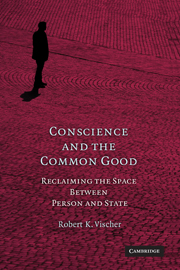6 - Pharmacies
Published online by Cambridge University Press: 05 June 2012
Summary
Given the morally controversial nature of developing medical technologies and the centrality of health care decisions to virtually all modern conceptions of individual autonomy, it is no surprise that health care is a primary battleground in today's conscience wars. Health care consumers are understandably concerned at the prospect of a provider's moral qualms limiting the available range of treatment options, even if the consumer finds the treatment to be morally permissible. Providers are understandably concerned at the prospect of the state, acting on the consumer's behalf, compelling them to violate their own moral convictions. Both consumer and provider seem to have conscience on their side. Little attention has been paid to the nature, much less the importance, of the relational dimension of these conscience claims.
This omission is exemplified glaringly by the well-publicized battle over the extent to which pharmacists may allow their religiously shaped moral judgments to narrow the range of services they offer. Both sides beseech the state to enshrine collectively a particular vision of the individual's prerogative. On one side, conscience is invoked to justify legislation that would enable individual pharmacists to refuse to fill prescriptions on moral grounds without suffering any negative repercussions, whether in the form of government penalty, employment discrimination, or third-party liability. On the other side, conscience is invoked to justify legislation that would enable individual consumers to compel pharmacists to fill any legally obtained prescription without delay or inconvenience.
- Type
- Chapter
- Information
- Conscience and the Common GoodReclaiming the Space Between Person and State, pp. 155 - 178Publisher: Cambridge University PressPrint publication year: 2009

